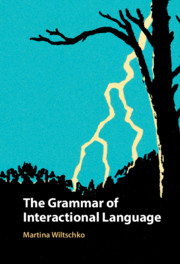Book contents
- The Grammar of Interactional Language
- The Grammar of Interactional Language
- Copyright page
- Dedication
- Contents
- Figures
- Tables
- Conversation Boards
- Acknowledgments
- Abbreviations
- Prologue
- 1 Interactional Language
- 2 The Syntacticization of Speech Acts
- 3 From Speech Acts to Interaction
- 4 The Interactional Spine Hypothesis
- 5 Initiating Moves: A Case-Study of Confirmationals
- 6 Reacting Moves: A Case-Study of Response Markers
- 7 The Grammar of Interactional Language
- Epilogue
- Bibliography
- Index
4 - The Interactional Spine Hypothesis
Published online by Cambridge University Press: 28 May 2021
- The Grammar of Interactional Language
- The Grammar of Interactional Language
- Copyright page
- Dedication
- Contents
- Figures
- Tables
- Conversation Boards
- Acknowledgments
- Abbreviations
- Prologue
- 1 Interactional Language
- 2 The Syntacticization of Speech Acts
- 3 From Speech Acts to Interaction
- 4 The Interactional Spine Hypothesis
- 5 Initiating Moves: A Case-Study of Confirmationals
- 6 Reacting Moves: A Case-Study of Response Markers
- 7 The Grammar of Interactional Language
- Epilogue
- Bibliography
- Index
Summary
Chapter 4 introduces the core of the proposal, namely the Interactional Spine Hypothesis, which provides a framework within which to analyze interactional language. The chapter begins by introducing the empirical phenomena to be addressed, namely confirmationals and response markers, and further introduces the analytical, theoretical, and methodological problems raised by these forms of interactional language. It show how the universal spine, which regulates propositional language, can be extended to incorporate the functions of interactional language, namely establishing common ground (grounding) as well as regulating turn-taking (responding). It is further shown that to understand interactional language one has to differentiate between those aspects of interaction that are regulated by grammatical means and those that come about via inferencing, which themselves are based on assumptions about the normal course of a conversation. Finally, it is shown that the study of interactional language requires a mix of methodologies in order to accommodate the role of context.
Keywords
- Type
- Chapter
- Information
- The Grammar of Interactional Language , pp. 72 - 92Publisher: Cambridge University PressPrint publication year: 2021

